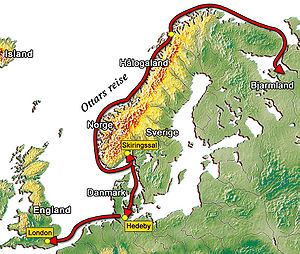- Ohthere of Hålogaland
-
Ohthere of Hålogaland (Norwegian: Ottar fra Hålogaland) was a Viking adventurer from Hålogaland. Around 890 AD he travelled to England, where Alfred the Great, king of Wessex, had his tales written down.
Ohthere reported that he lived "north-most of all the Northmen", and that "no-one [lived] to the north of him".[1] He spoke of his travels north to the White Sea, and south to Denmark and England, describing his route. He also spoke of Sweoland, the Sami people (Finnas), and of two peoples called the "Cwenas" living in Cwena land and the "Beormas". Ohthere reported that the Beormas spoke a language related to that of the Sami people, and lived in an area of the White Sea region.[2] This is marked on the accompanying map as "Bjarmland", and has been seen by some as a reference to people of the Old Permic culture.[citation needed]
Ohthere's story is the earliest known written source for the terms "Norway" (Norðweg) and "Denmark" (Denamearc).[3] The regular opinion is that the place where Ohthere lived was somewhere in the Malangen-area of southern Troms.[4]
Contents
Ireland
See also: Ottir IarlaModern trivia
Ohthere and his journey appear in the novel The Lost Dragon of Wessex (1957) by Gwendolyn Bowers.
In January, 2009, Othere fra Hålogaland [sic] was portrayed by Stephen John Mouat in the Lerwick Up-Helly-Aa, a fire festival in Shetland, Scotland.[5] A partly fictional version of the saga was retold as part of the festival.[6]
See also
- Varangians
- Bjarmland
Germanic peoples Languages Prehistory Roman Iron Age Migration Period Germanic Iron Age · Alamanni · Anglo-Saxons (Angles · Jutes · Saxons) · Burgundians · Dani · Franks · Frisii · Geats · Goths (Visigoths · Ostrogoths · Valagoths · Gothic Wars) · Gotlanders · Lombards · Suebi · Suiones · Vandals · Varangians · Christianization of the Germanic peoples · RomanizationSociety and culture Mead hall · Poetry · Migration Period art · Runes (Runic calendar) · Sippe · Law (Lawspeaker · Thing) · Calendar · King · Names · Numbers · Romano-Germanic cultureReligion Wodanaz · Veleda · Tuisto · Mannus · Paganism (Anglo-Saxon · Continental Germanic mythology · Frankish · Norse) · Christianity (Arianism · Gothic)Dress Warfare Burial practices List of Germanic peoples · Portal:Ancient Germanic cultureReferences
- ^ Thorpe, 1900, pp. 249-253. "Norðmanna": literally "North-men", a general term, but "Norwegians" is perhaps to be understood.
- ^ Helle, 1991, p. 21
- ^ Thorpe, 1900, p. 253.
- ^ Helle, 1991, p. 20
- ^ http://shetlopedia.com/Lerwick_Up_Helly_Aa_2009
- ^ http://www.uphellyaa.org/up-helly-aa-2009/saga-of-othere-fra-halogaland
Bibliography
- Ohthere's First Voyage. University of Victoria. Retrieved on May 18, 2008. Excerpt only of original text; English translation.
- Old English Online: Lesson 4. University of Texas. Retrieved on May 18, 2008. Excerpt only of original text; detailed grammatical analysis, English translation.
- Helle, Knut (1991). Grunntrekk i norsk historie. Universitetsforlaget Oslo. pp. 19–21.
- Onions, C.T. (ed.), Sweet's Anglo-Saxon Reader in Prose and Verse (14th edition), Clarendon, 1959. An excerpt from Alfred's account of Ohthere's travels.
- Thorpe, B., The Life of Alfred The Great Translated From The German of Dr. R. Pauli To Which Is Appended Alfred's Anglo-Saxon Version of Orosius, Bell, 1900, pp. 249–53. Parallel editions of King Alfred's full Old English text and a modern translation.
Categories:- History of Norway
- Norwegian explorers
- Vikings
- White Sea
- Explorers of the Arctic
- 9th-century people
Wikimedia Foundation. 2010.


